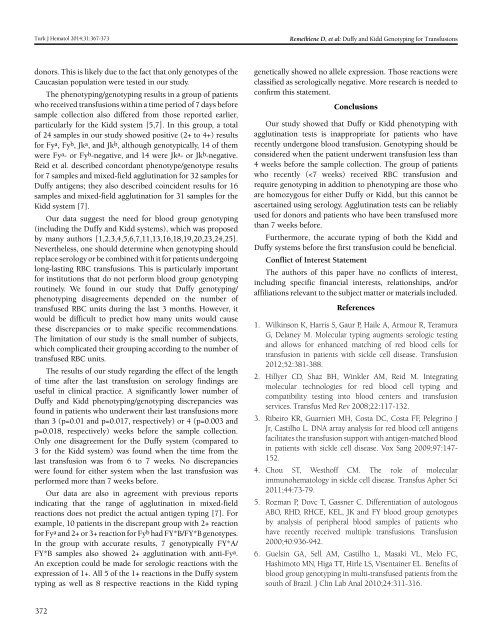Turkish Journal of Hematology Volume: 31 - Issue: 4
You also want an ePaper? Increase the reach of your titles
YUMPU automatically turns print PDFs into web optimized ePapers that Google loves.
Turk J Hematol 2014;<strong>31</strong>:367-373<br />
Remeikiene D, et al: Duffy and Kidd Genotyping for Transfusions<br />
donors. This is likely due to the fact that only genotypes <strong>of</strong> the<br />
Caucasian population were tested in our study.<br />
The phenotyping/genotyping results in a group <strong>of</strong> patients<br />
who received transfusions within a time period <strong>of</strong> 7 days before<br />
sample collection also differed from those reported earlier,<br />
particularly for the Kidd system [5,7]. In this group, a total<br />
<strong>of</strong> 24 samples in our study showed positive (2+ to 4+) results<br />
for Fya, Fy b , Jk a , and Jk b , although genotypically, 14 <strong>of</strong> them<br />
were Fya- or Fy b -negative, and 14 were Jk a - or Jk b -negative.<br />
Reid et al. described concordant phenotype/genotype results<br />
for 7 samples and mixed-field agglutination for 32 samples for<br />
Duffy antigens; they also described coincident results for 16<br />
samples and mixed-field agglutination for <strong>31</strong> samples for the<br />
Kidd system [7].<br />
Our data suggest the need for blood group genotyping<br />
(including the Duffy and Kidd systems), which was proposed<br />
by many authors [1,2,3,4,5,6,7,11,13,16,18,19,20,23,24,25].<br />
Nevertheless, one should determine when genotyping should<br />
replace serology or be combined with it for patients undergoing<br />
long-lasting RBC transfusions. This is particularly important<br />
for institutions that do not perform blood group genotyping<br />
routinely. We found in our study that Duffy genotyping/<br />
phenotyping disagreements depended on the number <strong>of</strong><br />
transfused RBC units during the last 3 months. However, it<br />
would be difficult to predict how many units would cause<br />
these discrepancies or to make specific recommendations.<br />
The limitation <strong>of</strong> our study is the small number <strong>of</strong> subjects,<br />
which complicated their grouping according to the number <strong>of</strong><br />
transfused RBC units.<br />
The results <strong>of</strong> our study regarding the effect <strong>of</strong> the length<br />
<strong>of</strong> time after the last transfusion on serology findings are<br />
useful in clinical practice. A significantly lower number <strong>of</strong><br />
Duffy and Kidd phenotyping/genotyping discrepancies was<br />
found in patients who underwent their last transfusions more<br />
than 3 (p=0.01 and p=0.017, respectively) or 4 (p=0.003 and<br />
p=0.018, respectively) weeks before the sample collection.<br />
Only one disagreement for the Duffy system (compared to<br />
3 for the Kidd system) was found when the time from the<br />
last transfusion was from 6 to 7 weeks. No discrepancies<br />
were found for either system when the last transfusion was<br />
performed more than 7 weeks before.<br />
Our data are also in agreement with previous reports<br />
indicating that the range <strong>of</strong> agglutination in mixed-field<br />
reactions does not predict the actual antigen typing [7]. For<br />
example, 10 patients in the discrepant group with 2+ reaction<br />
for Fya and 2+ or 3+ reaction for Fy b had FY*B/FY*B genotypes.<br />
In the group with accurate results, 7 genotypically FY*A/<br />
FY*B samples also showed 2+ agglutination with anti-Fya.<br />
An exception could be made for serologic reactions with the<br />
expression <strong>of</strong> 1+. All 5 <strong>of</strong> the 1+ reactions in the Duffy system<br />
typing as well as 8 respective reactions in the Kidd typing<br />
genetically showed no allele expression. Those reactions were<br />
classified as serologically negative. More research is needed to<br />
confirm this statement.<br />
Conclusions<br />
Our study showed that Duffy or Kidd phenotyping with<br />
agglutination tests is inappropriate for patients who have<br />
recently undergone blood transfusion. Genotyping should be<br />
considered when the patient underwent transfusion less than<br />
4 weeks before the sample collection. The group <strong>of</strong> patients<br />
who recently (

















